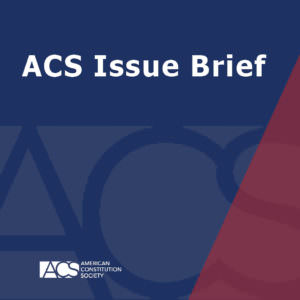Teeth in the Tiger: Organizational Standing as a Critical Component of Fair Housing Act Enforcement
Trial Attorney, Civil Rights Division, U.S. Department of Justice
Chief Operating Officer, Association for the Public Defender of Maryland
April 19, 2012
 ACS is pleased to distribute “Teeth in the Tiger: Organizational Standing as a Critical Component of Fair Housing Act Enforcement,” an Issue Brief by Melissa Rothstein, Deputy Director of the Equal Rights Center, and Megan K. Whyte, Director of the Fair Housing Project at the Washington Lawyers’ Committee for Civil Rights and Urban Affairs.
ACS is pleased to distribute “Teeth in the Tiger: Organizational Standing as a Critical Component of Fair Housing Act Enforcement,” an Issue Brief by Melissa Rothstein, Deputy Director of the Equal Rights Center, and Megan K. Whyte, Director of the Fair Housing Project at the Washington Lawyers’ Committee for Civil Rights and Urban Affairs.
Litigation by fair housing organizations has been essential to ensure compliance with the Fair Housing Act and other civil rights laws. In recent years, however, courts have chipped away at the ability of civil rights organizations to gain access to the courts, even as studies reveal that administrative mechanisms alone are insufficient to cure discrimination. In this Issue Brief, the authors explore the importance of organizational standing with respect to fair housing organizations, and why broad standing requirements for enforcement actions under the Fair Housing Act (FHA) should remain intact.
The authors discuss the enforcement mechanisms within the Fair Housing Act and provide a history of organizational standing in fair housing cases, finding that “the legislative and judicial history of the FHA and the FHA Amendments [are] clear that an expansive view of standing … is appropriate in FHA actions.” According to the Issue Brief, any efforts to erect new barriers to standing conflict with the intent of the law and would stifle fair housing organizations’ work to combat discrimination. Modern discriminatory housing practices, the Issue Brief suggests, are successfully addressed by fair housing organizations because they “have the knowledge and capacity to gather evidence, propose effective remedies, and monitor compliance."
The Issue Brief recommends amending the Fair Housing Act to provide a private right of action for those aggrieved by a jurisdiction’s failure to affirmatively further fair housing, thereby complementing fair housing organizations’ broad standing for FHA enforcement actions. Authors Rothstein and Whyte conclude by noting the progress made in improving equal access to housing over the past several decades—progress, the authors contend, “can be attributed in large part to the availability of private enforcement mechanisms” and the “strong avenues for [fair housing] organizations to enforce FHA violations,” which must remain intact.
Read the full Issue Brief here: Teeth in the Tiger: Organizational Standing as a Critical Component of Fair Housing Act Enforcement
